The Vintons and I parted with the student group near the bottom of the mountain, with us going on to the southeast and the students planning to continue northwest to Dar es Salaam. Little did I suspect that instead of their expected 5 to 6 hour trip, the students would end up spending 20 hours on the road due to the severe flooding and traffic problems near Dar. In describing their ordeal to me in an email, John said that water had covered the road so far and so deeply that he was "afraid" when the driver crossed through it. In all of our many times of being in Africa over a period of 40+ years, I had never heard John express fear of anything, so I know the situation must have been dire. The students, however, were real champions and were finally checked into a nice, clean hotel at 4:00 a.m. on Monday instead of being picked up by host families at 3:00 p.m. Sunday as scheduled.
Oblivious of the drama the others were experiencing, I rode on with the Vintons until we reached Morogoro soon after 4:00 p.m. and checked into the 4U Executive Hotel, a nice new Tanzanian establishment, with clean room, hot water, and most importantly air conditioning. After a brief shower and change of clothes, we all went to dinner at a very nice Indian-owned resort hotel, which Steve said had great food for reasonable prices--and he was correct. Nothing I saw in Morogoro seemed very interesting and it was quite hot and dusty. Of course, I didn't really get to explore as we were only there to eat dinner, stay the night, and then continue on or journey.
While eating dinner, we saw some TV news about a bridge being flooded or washed out, and at first Steve thought it might be a bridge that was on our way. However, it turned out that the problem was near Dar, and, in fact, a British woman who was also eating her dinner told us that she had been told not to bother trying to get to Dar to make her scheduled flight home that night. Still, I did not connect this with the bus full of students traveling to Dar.
The next morning, after a less than ample breakfast at our hotel, we continued on toward Iringa, Mafinga, and places beyond. The day was bright and sunny for much of the time, and we seemed to make good time. For lunch, we stopped at a huddle of shops, cafes and toilets where passenger buses make rest stops. Such places intrigue me because they offer such a strange variety of wares for purchase, but they also scare me sh------ because they offer rows of squat toilets, which for me are almost insurmountable obstacles. If I lower too far, I risk never rising again or falling down on a far less than hygienic floor, and if I don't lower enough, I risk peeing all over my underwear and clothes. I always pray that there will be a big 5-gallon bucket of water in the stall since that is just enough of a hold for me to make it down and up successfully. Then, of course, there is the need to always, always carry a wad of TP in one's pocket or bra.
Susan or Steve bought a packet of samosas, which we then ate as we drove on toward Iringa and the escarpment we would have to climb before reaching the southern highlands. I have always wanted to visit Iringa and was hoping we would stop there for a meal or a bit of shopping. However, Steve was intent on making good time on the road, and since the road bypassed the town center of Iringa, I saw very little of it as we whizzed by. Somewhere along the route, the highway cut right through Ruaha National Park, and we saw giraffes, zebras, gazelles, baboons, and lots
of elephants as we passed by. (I may be confused about sequence here and if so, I will try to correct this all later.) The drive up and up the escarpment was very dramatic both for the views and the dangers. Big trucks came rumbling around blind curves, and Steve's attempts to pass trucks going up the inclines seemed like a gamble each time. We saw one large tanker which had gone off the edge and was barely hanging on above the drop to the bottom far down the mountainside. I was so dazed by this time, that nothing untoward seemed to faze me.
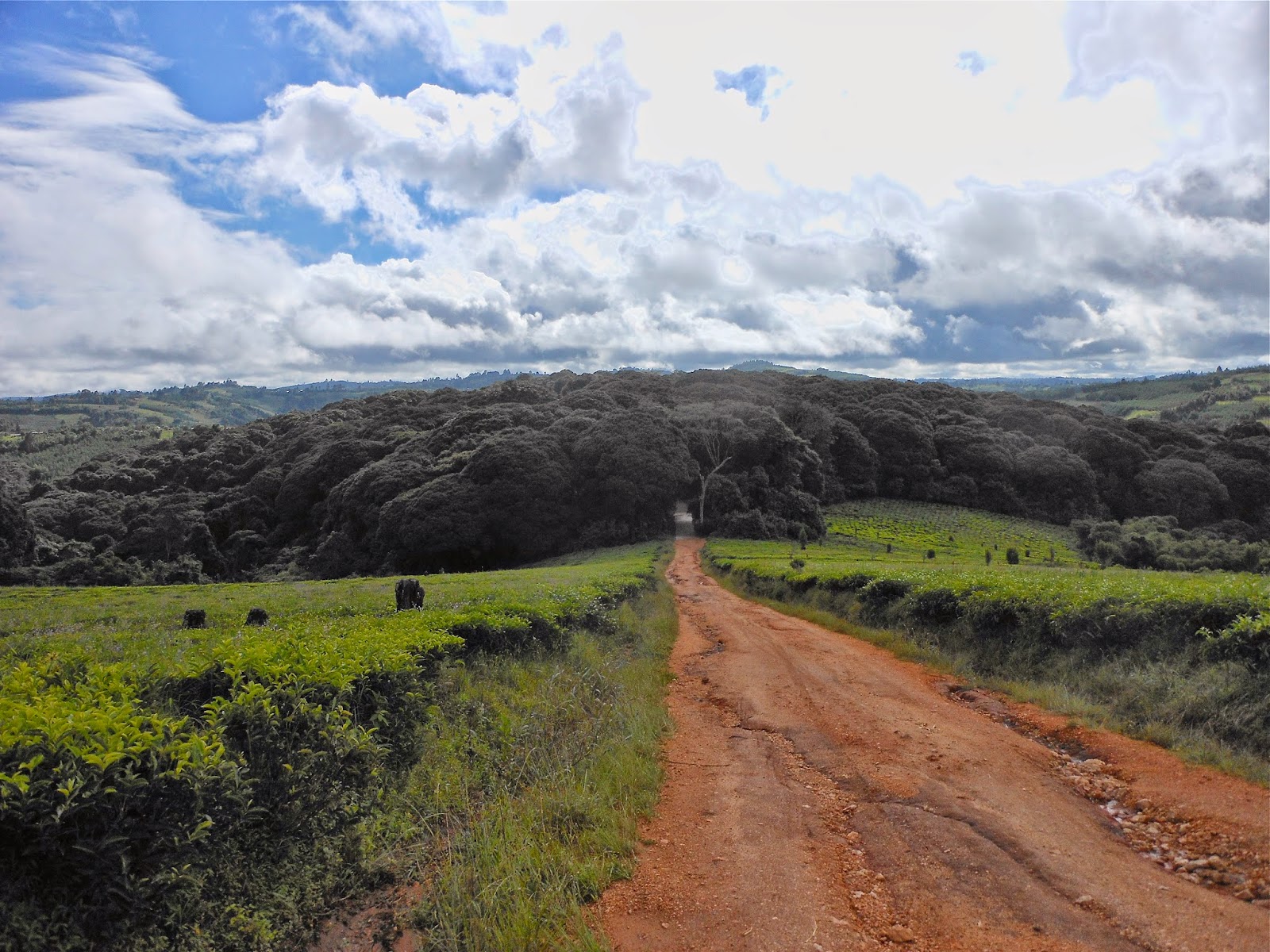 |
| One of the typical stretches on our main road. |
When we finally reached Mafinga, a tough little crossroad full of truckers and lumber yards, I thought we would be at the Vinton's home in an hour or so. Silly me: I was thinking in terms of map distance not rough and muddy dirt road reality. It had been raining off and on, and soon we were off all asphalt and jolting from side to side as Steve tried to find even enough patches to keep the car upright and out of the ditches. So, what I had thought would be a short drive turned into a rather harrowing slip and slide through the mud with one big landing in a ditch that Steve thought would maroon us for the night. Fortunately, some direction from Jonathan and white-knuckle maneuvers from Steve freed us and we continued on through huge tea plantations and forests. Unilever is the major "owner" of land in this area, and lumber is another major product, with people planting large areas with pines which can then be cut after ten years of growth. The rolling hills seemed endless, but finally after maybe four hours, we pulled into the grounds of Madisi Secondary School and next to the Vintons house.
 |
| Tea Fields |
 |
| Forest area and branches of the droopy pines that are raised for lumber. |
 |
| Susan surveying the mud in front of the school's administration building. |
Everyone had been telling me that where I was headed would be cold, so I had bought a sweater in one of the used clothing markets in Arusha. However, nothing prepared me for the combination of cooler temperatures and constant rain for the first three days I was at Madisi Secondary School with the Vintons. The temperature never got higher than 65º during the days and fell as low as 60º in the nights. Crawling into bed at night was like crawling into a pile of wet laundry, and there was no way to feel warm unless one crouched over a jiko (charcoal burner), which Susan did often. The Vinton's house was enormous, but very sparse with concrete floors and no electricity until the generator went on sometime around 7:30 and ran until maybe 10:00 or 10:30 each evening. There was a solar power collector setup, but that was designated for recharging crucial computers and cellphones. On cloudy days, everyone sort of bumped about in the semi-darkness, and Susan and her niece, Janelle, wore headlamps when they had to see what they were doing. It was a strange and eery feeling to walk about indoors with a flashlight in hand.
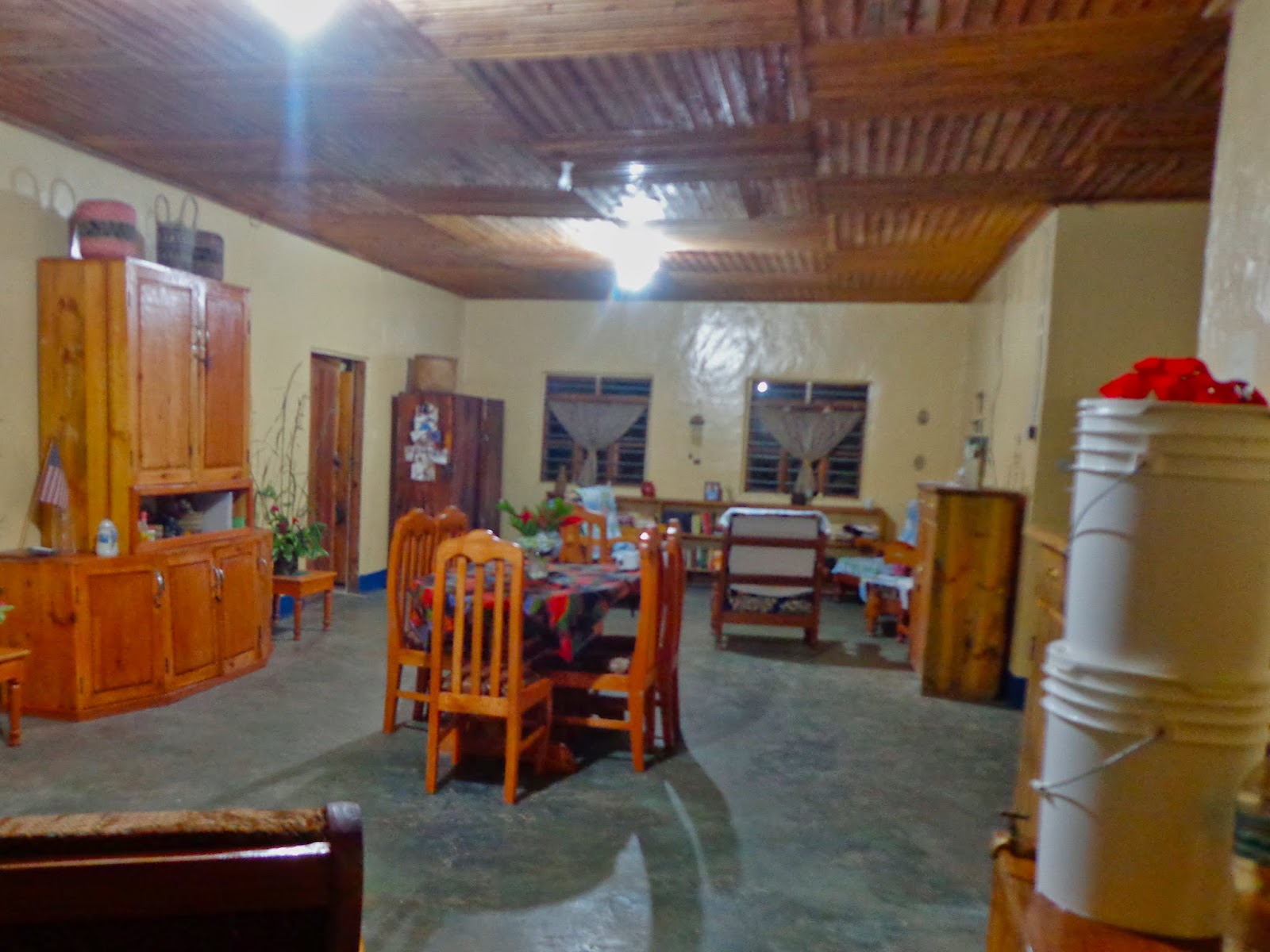 |
| The main family living area. |
 |
| Checking with Mama Lillian to see how the mid-day meal is progressing. |
 |
| Preparing supper in the dark. |
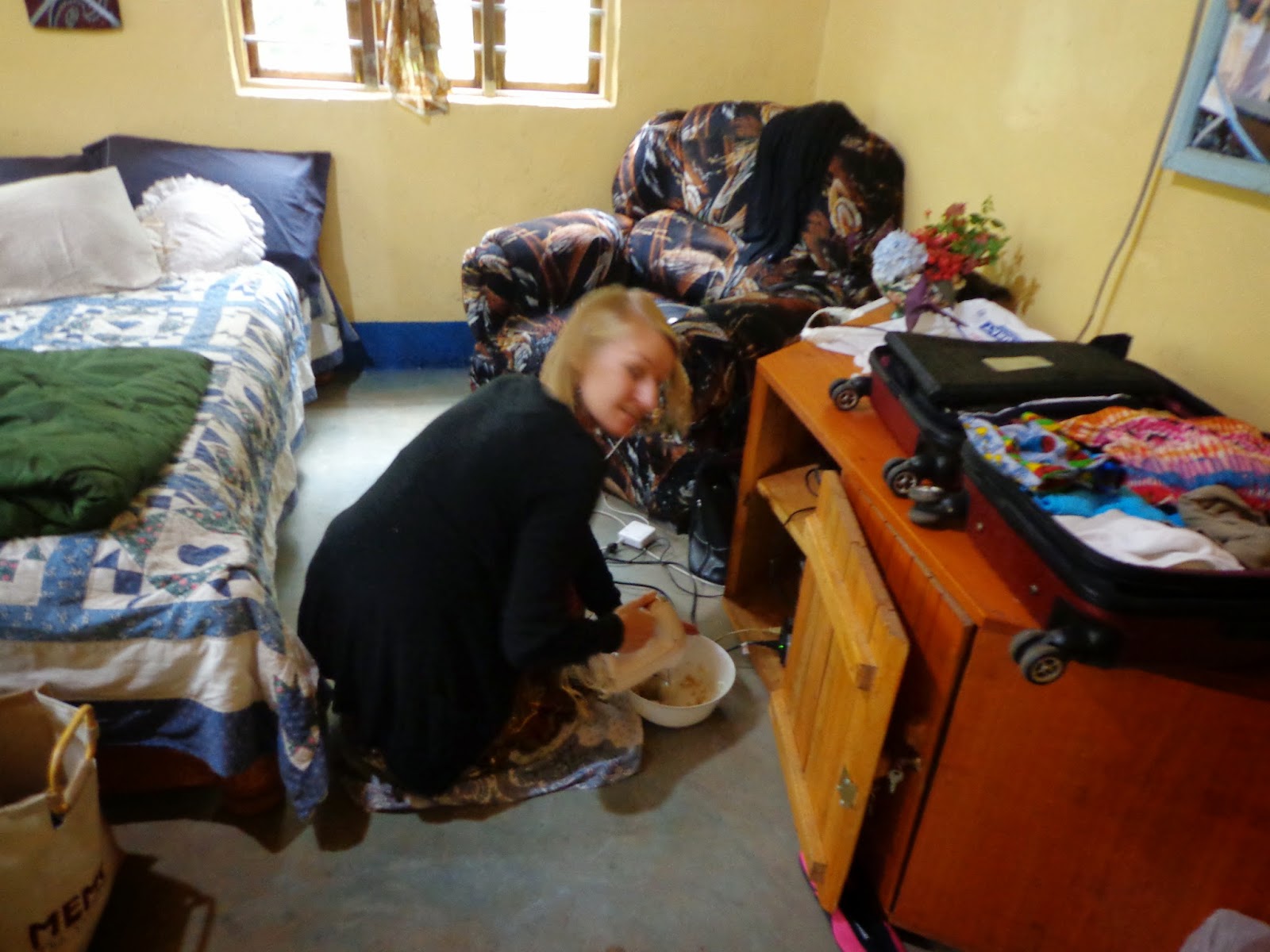 |
| Janelle using power from the solar battery to make cake frosting. |
 |
| Here I am holding a flashlight so Janelle can see what she is doing. |
|
Even though it was wet and dreary, Susan had me out on Tuesday morning to go to see the school and speak to the English classes for Forms 2 & 4. I was scared that I would slip in the mud and completely embarrass myself, but that didn't happen. What did happen was complete astonishment when I entered the inner courtyard of the school. I have extolled the work of Village Schools Tanzania (www,villageschools.org), but nothing I had see in photos and videos or heard from Steve and Susan prepared me for the incredible school I was now seeing for myself. I had absolutely no way to capture the vastness of its scale and the incredible amount of work and effort that had to be given in its construction. Except perhaps for a very successful international private school or a college, I had never seen an African school of this magnitude--and I was told that Madisi is only mid-size among the Village Schools. All the classrooms were full of students, and all the teachers were present. (That last part about the teachers may seem obvious, but not in Africa, where one of the biggest problems in education is absentee teachers.) It is no wonder that this school and other Village Schools earn some of Tanzania's highest success rates on state exams. And, these are students from very poor Hehe villages and many are AIDS orphans.
 |
| The view out over the roofs of the teachers' houses. |
 |
| Inside the courtyard: The administration building sits at the end of a huge horseshoe of classrooms. |
 |
| A partial view of the school from the next hilltop. |
 |
| Hehe Houses |
Wednesday afternoon, the sun broke through briefly in the late afternoon, and so Susan took off to the nearby village to check on some of the people she monitors for HIV/AIDS care. Several hundred show up for their ARV medication on each clinic day, but some miss or if female are prevented from coming by their husbands. It was my first time out in the Hehe region, and because I was hesitant to take photos of most people and places, I tried to look carefully, so I could remember what I saw. The houses were built of mud bricks, some fired and some not, and people who could afford it had metal roofing. There were still many houses with thatched roofs, however. Most houses were near the roads, which have been cut for the tea plantation and lumber industry. The villages were linear along the the tops of the mountain ridges. Susan told me that the electrical line had come into the area only two years ago but has already really changed a lot of village life. I was surprised by the many
dukas (little shops) that have sprung up along the road.
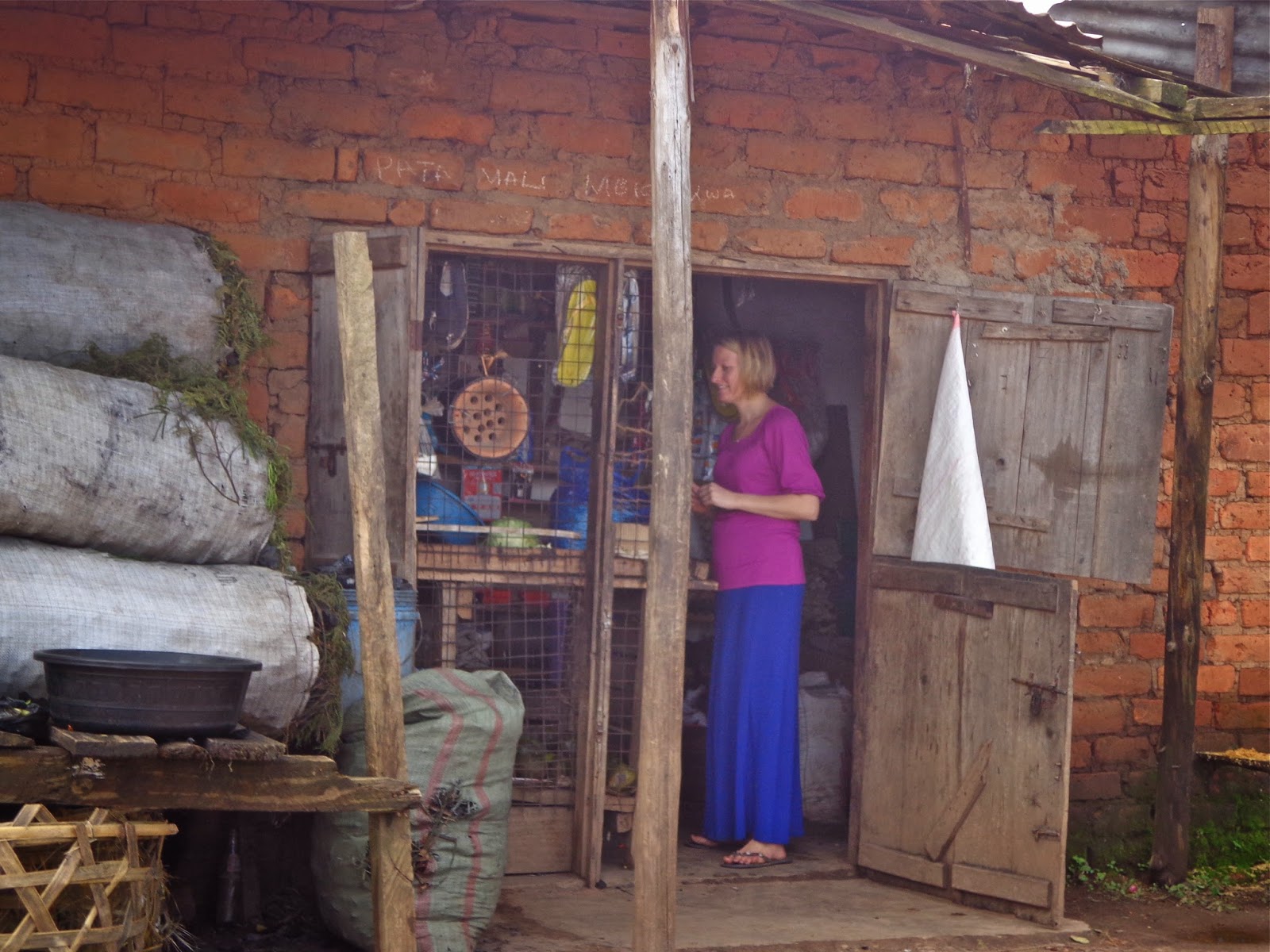 |
| Janelle at her local Walmart. |
 |
| Pouring gasoline into bottles for sale. |
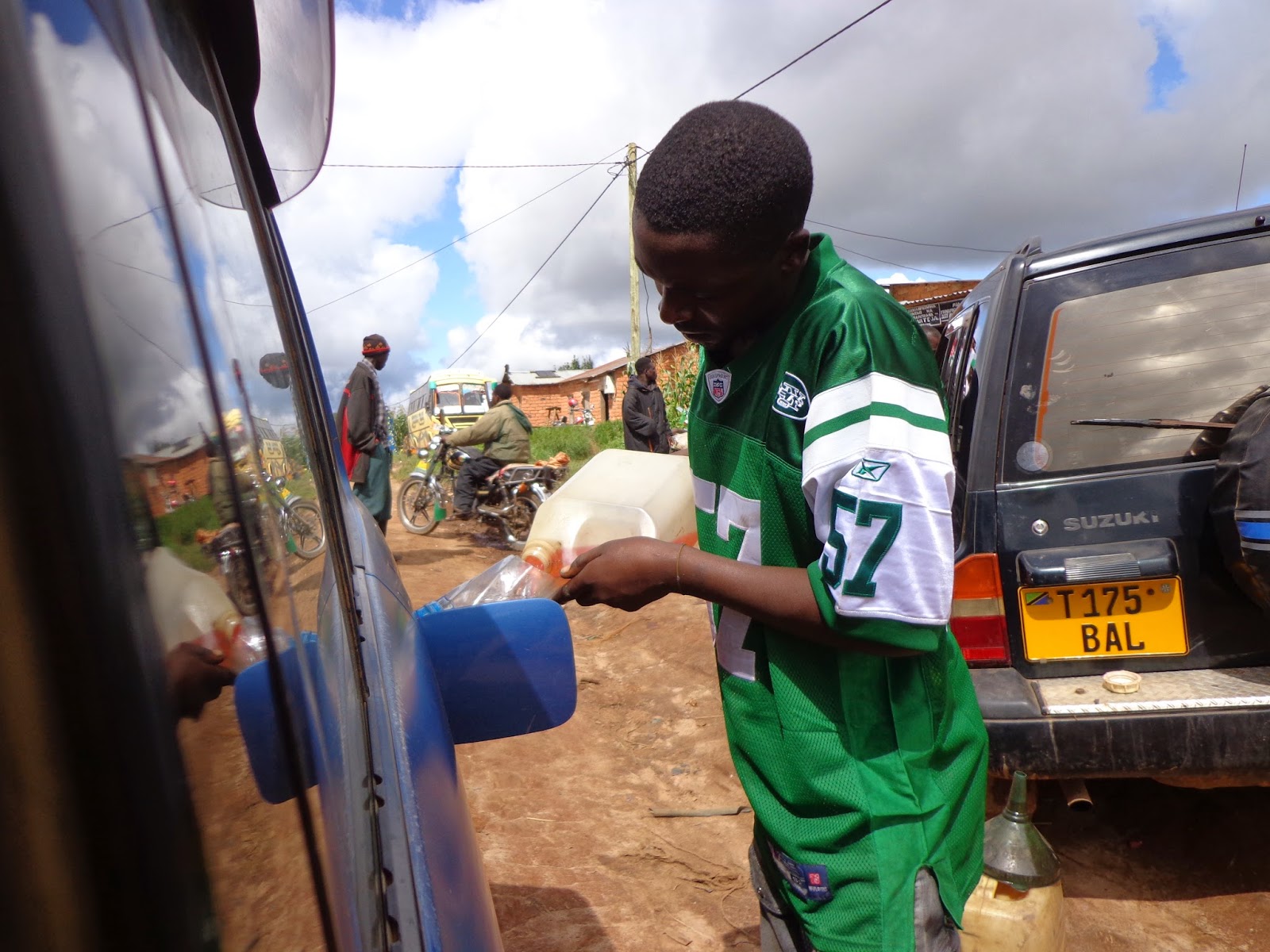 |
| Filling up at the local gas station. |
 |
| Out in the field with Susan. |
 |
| Every morning a mother with a sick child was waiting for Susan. |
I've already reported on Facebook about the wild rainy evening we had when Susan tracked down a mother and child who had not come into the clinic as scheduled. First, we stopped at Baba Odeko,'s house because he is the section overseer for the road on which this woman lived. We found her and her small child, Agnes, and they both have AIDS, as does the father. According to the young mother, her husband would not allow her to attend the clinic and get her anti-virals. So, we went down the road to the house where the second wife lived and then on to the mother-in-law's house to find out where the man had gone. By this time, we had Susan, Janelle, Mama Grace and her baby (She's the wife of one of the Tanzanian founders of Village Schools), the AIDS mother and her daughter, Agnes, the mother-in-law, Baba Odeko, and Odeko himself all crammed into a relatively small SUV. Furthermore, at least the mother and Agnes had drug-resistant TB, and the mother was coughing up blood. Inside, I was screaming "Face mask!" but I remained calm as we sped on in the night, hunting the bar where the scoundrel man was hiding. Actually, he had fled into the fields and Odeko had to get his cell phone number from one of his bar mates and then call him to turn himself in. So, he ended up in the car as well. What a circus! In the end, it turned out that the young man had never married Agnes' mother and was living with the wife for whom he had paid a dowry. Furthermore, Agnes' mother had her medication but wasn't taking is in order to die and shame her non-husband in some way. The other reality was that the "real" wife and her little girl were also HIV positive and the father had already developed Karposi sarcoma on his leg. So, we dropped off the mother-in-law at her house; Susan gave a tongue-lashing to both of Agnes' parents. telling them that their little girl needed family to take care of her; and then we took everyone including Baba Odeko back home and drove home ourselves. Somewhere in this whole drama, Susan got a call telling her that I was expected for dinner at Immanual and Mama Chris' house, so I got dropped off there.
It was a total contrast in lives to sit comfortably with Mama Chris in her kitchen, watching her cook the chicken stew and feed her two boys, Chris and Junior. Immanual is the second Tanzanian in the partnership that founded and now heads Village schools, and Mama Chris and I had had a great English conversation the afternoon before. Like Godfrey and Mama Grace, this couple lives in one of the very nice houses that had been built for staff and their families. I felt very honored to be invited to join them for dinner and had a wonderful time until I was taken back to the Vintons' house for the rest of the night.
[Like Kenyans, Tanzanians identify mothers by the names of their first children, so I am Mama Rebecca here, or if someone does not know me, they would address me as "Bibi" since I am an older woman.]











































